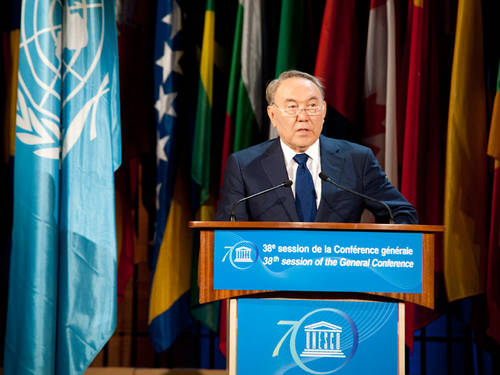At UNESCO, Kazakhstan’s President Nazarbayev calls for intercultural dialogue to counter extremism
Nursultan Nazarbayev, President of the Republic of Kazakhstan, on November 6 addressed the 38th session of UNESCO’s General Conference, the Organization’s governing body, on the occasion of its 70th anniversary.

The President praised UNESCO’s work “in maintaining our cultural and historical heritage and expanding international co-operation in education, science and communications.” In this context, the President proposed consideration of “a global strategy to eliminate the root causes of wars and conflicts.”
In responding to the threat to violent extremism, the President declared: “It is important that our collective efforts in countering Islamic radicalism do not confuse this distorted extremism with peaceful Islam. We can best counter extremism through inter-cultural and inter-religious dialogue,” he argued. In this light, the President informed about the proposal to establish a “Forum for Islam against Terrorism” in Kazakhstan.
Before addressing the General Conference, President Nazarbayev and UNESCO Director-General Irina Bokova discussed cooperation between Kazakhastan and the Organization in a bilateral meeting. The President emphasized UNESCO’s importance in the promoting inter-cultural and inter-religious dialogue, global citizenship education and social cohesion within and between societies “in current turbulent times.”
He also presented several new initiatives to scale up his country’s engagement in addressing global challenges, notably the establishment of an “Academy of Peace” under UNESCO auspices. He also invited UNESCO to have its own pavilion at the Astana Expo 2017 on Future Energy.
The President shared the Director-General’s vision that education is a key in preventing youth radicalization and countering violent extremism. He suggested that all countries should reallocate a proportion of defense spending to education.
The Director-General underscored Kazakhstan’s important contribution, in advancing the Organization’s objectives, notably through extra-budgetary programmes, and the country’s commitment to bolster regional and international cooperation.
Ms Bokova particularly welcomed Kazakhstan’s leadership in the proclamation of the International Decade for the Rapprochement of Cultures (2013-2022), for which UNESCO has been designated as the lead United Nations agency and praised the country for promoting the values of cultural pluralism, tolerance and inter-religious dialogue.
The President was accompanied by Deputy Prime-Minister Dariga Nazarbayeva and Foreign Affairs Minister Erlan Idrissov, as well as Education and Science Minister Aslan Sarinzhipov, along with Ambassador Nurlan Danenov, Permanent Delegate of Kazakhstan to UNESCO.
Source: United Nations Educational Scientific and Cultural Organization
- 412 reads
Human Rights
Ringing FOWPAL’s Peace Bell for the World:Nobel Peace Prize Laureates’ Visions and Actions

Protecting the World’s Cultural Diversity for a Sustainable Future

The Peace Bell Resonates at the 27th Eurasian Economic Summit

Declaration of World Day of the Power of Hope Endorsed by People in 158 Nations

Puppet Show I International Friendship Day 2020

